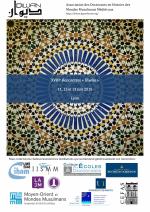The European Association of Archaeologists (EAA) 20th annual meeting will take place in Istanbul, on September 10th to 14th 2014.
It will host a session proposed by Joanita Vroom, Yona Waksman and Roos van Oosten, entitled:
"Medieval MasterChef. Eastern Cuisine and Western Food Customs: An Archaeological Perspective"
Theme: T04 Environment and subsistence: the geosphere, ecosphere and human interaction
session T04S011
The scope of this session is to discuss eating habits and food practices in Medieval Europe, using different approaches (archaeology, archaeometry, history) and specialities (e.g., ceramology, archaeozoology, archaeobotany, anthropology, etc.). Its perspective is that food, as a social and cultural marker, can be seen as a particularly significant factor in understanding complex relationships between a wide range of communities which were in contact, such as Byzantines, Muslims, Latins, Ottomans and others. Specific attention will be paid to the role of pottery (from transport amphorae to serving dishes or coarse wares) in the study of cuisine, cooking techniques and food customs. In this session we will investigate how, when and why transformations in pottery and other food-related markers took place, both in East and in West. Were developments in the East fundamentally different from those in the West? To what extent is it possible to link ‘cooking revolutions’ to changing pottery shapes, to changing food customs, to changing dietary practices, or perhaps even to house transformations? In short, can we understand these cultural and historical processes in an archaeological perspective?
Applications are welcome!
For more information:
https://www.eaa2014istanbul.org/
https://www.eaa2014istanbul.org/sayfa/141
The session is organized with the support of the French Institute for Anatolian Studies (IFEA).




